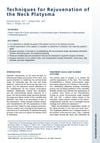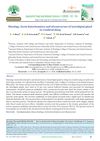 59 citations,
February 2012 in “Journal of Dermatological Science”
59 citations,
February 2012 in “Journal of Dermatological Science” Environmental factors at different levels control hair stem cell activity, which could lead to new hair growth and alopecia treatments.
44 citations,
January 2013 in “BMC Dermatology” TGFβ signaling prevents sebaceous gland cells from producing fats.
 42 citations,
January 2014 in “Cold Spring Harbor Perspectives in Medicine”
42 citations,
January 2014 in “Cold Spring Harbor Perspectives in Medicine” Hair growth is influenced by various body and external factors, and neighboring hairs communicate to synchronize regeneration.
 41 citations,
May 2018 in “Nutrition and healthy aging”
41 citations,
May 2018 in “Nutrition and healthy aging” Skin aging is largely due to differences in stiffness and elasticity between skin layers, leading to wrinkles.
 41 citations,
September 2017 in “Advanced Healthcare Materials”
41 citations,
September 2017 in “Advanced Healthcare Materials” A special hydrogel helps heal skin without scars and regrows hair.
 37 citations,
February 2019 in “Experimental Dermatology”
37 citations,
February 2019 in “Experimental Dermatology” Spiny mice are better at regenerating hair after injury than laboratory mice and could help us understand how to improve human skin repair.
 30 citations,
July 2017 in “Stem cells and cloning”
30 citations,
July 2017 in “Stem cells and cloning” SVF-enhanced adipose transplantation shows potential as a hair loss treatment.
 30 citations,
January 2008 in “Dermatologic Surgery”
30 citations,
January 2008 in “Dermatologic Surgery” Dermatologists perform most outpatient cosmetic procedures in the U.S., especially on white women aged 40 to 59.
 29 citations,
April 2020 in “Biomolecules”
29 citations,
April 2020 in “Biomolecules” The 3D scaffold helped maintain hair cell traits and could improve hair loss treatments.
 29 citations,
June 2018 in “Scientific Reports”
29 citations,
June 2018 in “Scientific Reports” 15-lipoxygenase helps keep skin healthy by reducing inflammation.
 28 citations,
April 2023 in “Stem cell research & therapy”
28 citations,
April 2023 in “Stem cell research & therapy” Tiny vesicles from stem cells could be a new treatment for healing wounds.
 22 citations,
October 2018 in “Aesthetic Plastic Surgery”
22 citations,
October 2018 in “Aesthetic Plastic Surgery” Understanding hair follicle biology and stem cell control could lead to new hair loss treatments.
 21 citations,
March 2017 in “Skin research and technology”
21 citations,
March 2017 in “Skin research and technology” Removing external lipids from hair reduces moisture and increases strength, while removing internal lipids decreases water permeability.
 20 citations,
May 2015 in “Regenerative Medicine”
20 citations,
May 2015 in “Regenerative Medicine” The document warns against US clinics selling untested stem cell treatments without FDA approval.
 18 citations,
November 2013 in “Molecules and Cells”
18 citations,
November 2013 in “Molecules and Cells” New culture method keeps human skin stem cells more stem-like.
17 citations,
January 2004 in “European journal of obstetrics, gynecology, and reproductive biology/European journal of obstetrics & gynecology and reproductive biology” Certain hormone medications can treat symptoms like acne and unwanted hair, regulate periods, and prevent pregnancy in women and teenage girls.
 15 citations,
February 2016 in “Dermatologic Surgery”
15 citations,
February 2016 in “Dermatologic Surgery” Dermatologists are the main innovators in noninvasive cosmetic procedures, with other specialties also contributing significantly.
 14 citations,
November 2020 in “International Journal of Molecular Sciences”
14 citations,
November 2020 in “International Journal of Molecular Sciences” Advanced therapies like gene, cell, and tissue engineering show promise for hair regrowth in alopecia, but their safety and effectiveness need more verification.
13 citations,
May 2021 in “FASEB bioAdvances” Plant-based products can improve hair and skin health without harmful side effects.
 12 citations,
May 2019 in “Stem cell reviews”
12 citations,
May 2019 in “Stem cell reviews” Fetal-maternal stem cells in a mother's hair can help with tissue repair and regeneration long after childbirth.
12 citations,
October 2018 in “Aging male/The aging male” Higher BMI and lower testosterone are linked to more aggressive prostate cancer.
 12 citations,
April 2014 in “Facial Plastic Surgery Clinics of North America”
12 citations,
April 2014 in “Facial Plastic Surgery Clinics of North America” Direct excision techniques can rejuvenate the neck but may not enhance the jawline and could cause neck-face disharmony if done incorrectly.
11 citations,
March 2020 in “The journal of investigative dermatology/Journal of investigative dermatology” A specific group of skin stem cells was found to help maintain hair follicle cells.
8 citations,
June 2023 in “Journal of clinical medicine” Nanofat shows promise for facial rejuvenation and treating skin issues but needs more research for long-term safety.
8 citations,
July 2020 in “BMC genomics” The research found genes that change during cashmere goat hair growth and could help determine the best time to harvest cashmere.
 7 citations,
June 2022 in “Frontiers in Medicine”
7 citations,
June 2022 in “Frontiers in Medicine” ADSC-derived extracellular vesicles show promise for skin and hair regeneration and wound healing.
 4 citations,
December 2022 in “Advanced science”
4 citations,
December 2022 in “Advanced science” SCD1 is important for hair growth by keeping the connection in skin cells where hair stem cells live stable.
 4 citations,
August 2021 in “Clinics in Dermatology”
4 citations,
August 2021 in “Clinics in Dermatology” Stem cells show promise for hair loss and skin treatments in aesthetics but need more research on safety and standard methods.
 4 citations,
January 2018 in “Advances in Experimental Medicine and Biology”
4 citations,
January 2018 in “Advances in Experimental Medicine and Biology” The document concludes that hair follicles have a complex environment and our understanding of it is growing, but there are limitations when applying animal study findings to humans.
 3 citations,
December 2020
3 citations,
December 2020 The interdigital gland in crossbred sheep is similar to skin and has specialized structures for secretion.






















